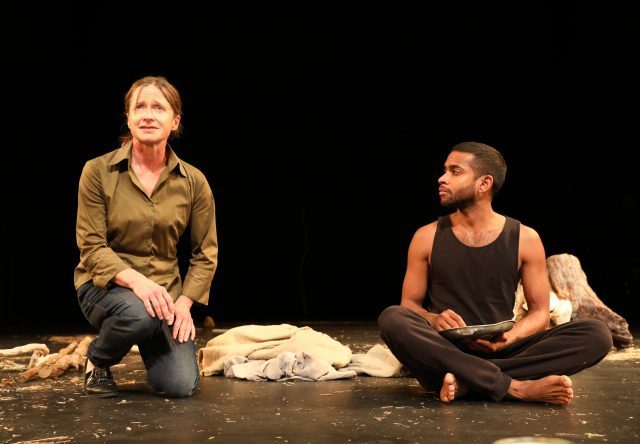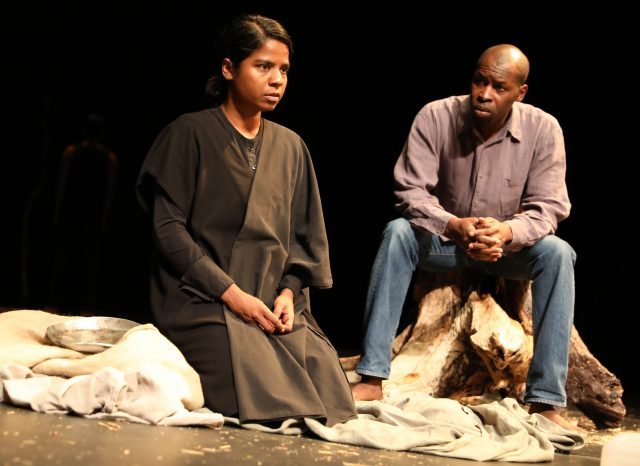
A woman (Hayley Carmichael) visits a convicted man (Hiran Abeysekera) facing an unusual sentence in The Prisoner (photo © Joan Marcus)
Theatre for a New Audience, Polonsky Shakespeare Center
262 Ashland Pl. between Lafayette Ave. & Fulton St.
Tuesday – Sunday through December 16, $90-$115
866-811-4111
www.tfana.org
Peter Brook and Marie-Hélène Estienne and their C.I.C.T. — Théâtre des Bouffes du Nord return to Theatre for a New Audience’s Polonsky Shakespeare Center with the existential parable The Prisoner, a meditative, minimalist adult fable about crime and punishment, forgiveness and forgetting. Inspired by an experience Brook had in Afghanistan more than sixty years ago, the seventy-minute piece is set in an unnamed land, on a mostly bare set (by David Violi) save for a tree stump and some scattered twigs and branches. Mavuso (Hiran Abeysekera) has committed an “unspeakable act,” and his sister, Nadia (Kalieaswari Srinivasan), and uncle, Ezekiel (Hervé Goffings), prepare his punishment, according to both ancient laws and the court system. He is ultimately sentenced to twenty years on a hill by himself, facing a prison, with no guards watching him, no barriers to walking away except those in his own mind. “There are no cells, no bars, and you will always have the temptation to leave,” Ezekiel instructs him. He also tells Mavuso that whenever someone asks him why he is there, he must answer, “I am here to repair.” Over the years, he is visited by a woman traveler (Hayley Carmichael), a man from a nearby village (Omar Silva), his uncle, and a few drunk guards. “You are disturbing the system!” one of them declares, but nothing can change Mavuso’s intention to carry out his sentence.

The prisoners sister, Nadia (Kalieaswari Srinivasan), speaks with their uncle, Ezekiel (Hervé Goffings), in new work by Peter Brook and Marie-Hélène Estienne (photo © Joan Marcus)
The story includes bits of magic and such philosophical statements as “Everything is in the past” and “We want to possess everything without seeing that we have nothing,” but there is no moralizing. There is also no score but instead long silences. The passage of time is indicated by Philippe Vialatte’s lighting softly going down, then coming back up. Brook never found out what crime the man in Afghanistan had committed to receive such a fate, but Mavuso’s misdeed is named, and it serves to further complicate his sentence. The time period and place are also left ambiguous, made more so by a cast of diverse actors with different accents and heritages, leaving plenty of space for each audience member’s individual imagination. Only the traveling woman wears shoes; everyone else is barefoot, walking over the wood (and hopefully avoiding splinters). Written and directed by Tony, Emmy, and Obie winner Brook and Estienne (Samuel Beckett’s Fragments, The Valley of the Astonishment, Can Themba’s The Suit), The Prisoner raises issues of tolerance and hate, love and judgment, birth and rebirth, fathers and sons, and the prisons that we all build for ourselves. When Mavuso — who wanted to be judged for his actions, since he judged the actions of others — sits quietly and stares out at the jail, he is looking over the audience, almost as if we are all in a prison as well and need to repair something in our lives as we sit still, looking back at him. Seeing such beautifully engaging and thoughtful works as The Prisoner is not a bad place to start that reparation process.